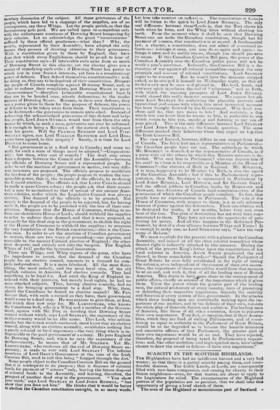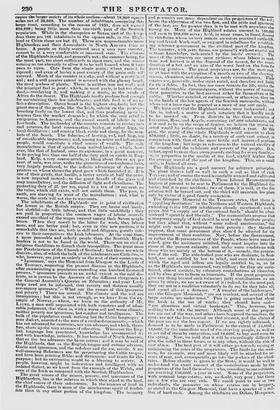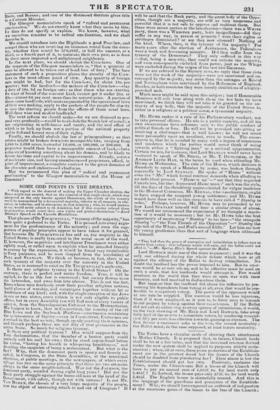SCARCITY IN THE SCOTTISH HIGHLANDS.
THE Highlanders have had an indifferent harvest and a very bad winter; so that there is a partial scarcity among them, and consi- derable distress. The Celtic Lairds, or Lords, are consequently filled with new-born compassion, and cowing for charity to their Saxon neighbours—even, for that matter, are about to apply to the Legislature for relief. The circumstances of the Highland. portion of the population are so peculiar, that we shall take this opportunity of giving a brief sketch of them. The area of the Highland or mountainous part of Scotland • cupies the larger moiety of its whole surface—about 18,000 square miles out of 30,000. The number of inhabitants ,necupying this
htsse tract, according to the census of 1831, does not exceed 400,000; being little more than one-sixth part of the Sentiish population. While in the champaign or Saxon part of the king- dom there are 166 inhabitants to the square tulle, in the High- land or Celtic there are but 22. There are unquestionably more Highlanders and their descendants in North America then at home. A people so thinly scattered over a very poor country, cannot be in a very comfortable or improved state. The climate of the Highlands is cold, and generally wet ; the summer being, for the most part, too short sufficiently to ripen corn, and the winter corning on too abruptly to allow it to be well bouset1 when it hap- pens to ripen. Oats form the staple grain ; wheat cannst be ripened ; end even of barley a poor variety of the grain only succeed. Much of the country is rocky, and without a parne:e of soil ; and a still greater extent is coveted with the gloomy heath. the most useless of plants. There is neither iron nor coal : and the principal fuel is peat ; which, in most parts, is but too noun dann—overlaying it, and making it a waste, as the sands of Africa do the desert. The Highlands hardly produce food enough for maintaining their few inhabitants ; and this food is of nu in- Terior description. Oaten bread is the highest standard ; but the great mass of the people, like the Irish, subsist on the potato,— breeding freely on the lowest diet, and thus producing more la- bourers than the market demands ; for which the only relief is emigration to America, and the casual search of labour in the Lowlands. The husbandry of the country consists in raising oats and potatoes, for local consumption; barley, or rather bigg, for local distillation ; and rearing black cattle and sheep, for the mar- kets of the South. The fisheries, of herring, col, and ling, are of considerable importance; and, among an active and industrious people, would constitute a chief source of wealth. The oily manufacture is that of spirits, from malted barley ; which, huw- ever, like that of' Ireland, owes its existence, in a great Inca-ere, to its paying less than one half of the duty paid on spirits in Eng- land. Kelp, a very coarse article, yi Ming about five or six per cent. of soda, was once, under the protection of customhouse laws, very largely produced, to the infinite advantage of those pro- prietors on whose shores the plant grew which furnished it. It is one of their griefs, that tsarina, a better article at half the price. is now imported instead—to the great benefit of the glass and soap manufactory, and the diffusion of light and cleanliness. The protecting duty of 2/. per ton, equal to a tax of 30 per cent. on the value, which still exists, will not satisfy them. The poor, in sooth, are starving for want of the manufacture ; and, what is worse, the rents will not rise to war-rents.
The inhabitants of the Highlands are in point of civilization the lowest in the British empire. They are brave and hardy, but slothful—do little labour, and that little unskilfully : they are paid in proportion ; the common wages of labour scarcely exceed one-third of the wages current among their Saxon neigh- bours. When they resort to the latter for work, they labour more, and are better paid; but, even in this new position, it is remarkable that they are, both in skill and diligence, greatly infe- rior to their competitors the Irish labourers. At the same time, a more peaceable and orderly people than the Scottish High- landers is not to be found in the world. There are no civil or religious disabilities to disturb their tranquillity. The great mass are Presbyterians of the Church of Scotland ; but there are whole districts, also, of which the bulk of the inhabitants are Catholics,— who, however, are just as orderly as the rest of their countrymen.
"Ignorance," says the Memorial from Glasgow to the Lords of the Treasury, respecting the present distress in the Highlands, after enumerating a population exceeding one hundred thousand persons, " ignorance prevails to an awful extent in the said dis- tricts, as is proven by the Answers of the different clergymen to the General Assembly's Queries on Education; and your Lord- ships need not be informed, that poverty and distress usually accompany ignorance."—What are the causes of this ignorance anu poverty ? There are several. The climate and the soil are inauspicious ; but this is not enough, as we know from the ex- ample of Norway,—where, we learn on the authority of Mr. L. a man well acquainted with both countries and of admi- rable judgment, that there is, with a worse soil and worse climate, neither poverty nor ignorance, but comfort and intelligence. The bulk of the population speak nothing but the Celtic language ;
poor dialect, unsuited to the uses of a civilized community,—which has not advanced for centuries, nor can advance, and which, there- fore, shuts up the very avenues of education. 1Vherever the Eng- lish language has penetrated, knowledge has accompanied it; and with knowledge, industry. It has been said of North America, that as the bee advances the bison retires; and it may be said of the Highlands, that as the English tongue and culture advance, Gaelic and ignorance, and the red-deer and the roe, recede. S. me well-meaning Reformers are for perpetuating the Celtic tongue, and have been printing Bibles and dictionaries and tracts for this purpose; but its extirpation would be a blessing to society. A people, however, might be industrious and intelligent with an isolated dialect, as we know from the example of the Welch, and even of the Irish as compared with the Scottish Highlanders. The great source of the misery, poverty, and ignorance of the Highlanders, lies in the relation in which they stand to the land, the chief source of their subsistence. In the tenures of laud in the Highlands, there is more of the mischievous spirit of feudal- ism than in any other portion of the kingdom. The tenantry
and peasantry are more dependent on the proprietors of the soil. benne the abjectness of the two first, and the pride and ignorant.; of the last, are far greater than is to be met with anywhere else among us. Many of the Hiahland estates amount to 100,000 anal even to 200,000 acres ; held, in some cases, in lineal descent by chieftains whose no very remote ancestors practised cattle-lift- ing mid levied black-mail, or engaged in rebellions for establish. ing arbitrary government in the civilized part of the kingdom Tlo• tenantry, with petty farms, are generally without capital and \v thout knowledge, rack-rented by the lairds' stewards. The mass et' the peasantry are mere metiers; whose labour in seed- time and harvest is at the disposal of the tenant, for the consi- deration of a but and an acre of the worst land on the num for growing potatoes. The great proprietors are, for the most park er at least with the exception of a month or two of the shooting. season, absentees, and absentees in needy circumstances. Their estates arc., generally, under strict entail, and therefore not liable. fir thsir debts. In fact, they are mere tenants for life, under the moo unfavourable circumstances, without the power of turning their properties to the best account either for themselves or the Public. Whether entailed, or embarrassed, or otherwise, they are in the hands of the law agents of the Scottish metropolis, without elven not a lease can he granted or a move of any sort made.
We have said that the Highland estates were rackreuted ; and this is, indeed, a matter ot' such notoriety that it hardly needs
to be insisted on. From districts in the three counties of Inverness, Ross, and Argyle, containing 107,000 inhabitants, and trev said to be on the verge of famine, we believe the rental ex- acted would be rather underrated at 150,000/. a year. At this jam, the rental of the whole Highlands would amount to about 570,000/. ; • little, no doubt, for a territory of such vast extent, in comparison with that of the more fertile and improved portions of the kingdom ; but large in reference to the natural sterility of the country and the indolence and poverty of the people. It is, in fact, equal to more than seven pounds sterling for every family,— or, in proportion to the quality of the land, sixfold higher than the average rental of the rest of the kingdom. This, on a small scale, is Ireland all over.
The Highlands are a good nursery for arbitrary principles. No plant thrives half so well in such a soil as that of rank Tsryistn ; and of course the weed is carefully watered and cultivated and cherished by the chieftains. Three Liberal Representatives happen at present to be sent to Parliament by the Highland die. !riots ; but it is pure accident : two of them, it is said, at the dis- solution will be turned out, and the third will maintain his place only by virtue of a good family connexion. The Glasgow Memorial to the Treasury states, that there is "appalling destitution" in the Northern and Western Highlands, extending to the 107,000 inhabitants already mentioned ; and it prays .hat "a supply out of the national funds" should be admi- nistered " speedily and liberally." The memorialists propose that a temporary supply of food should be sent to the destitute people; but they admit that, without " some radical amelioration," this might only tend to perpetuate their poverty : they therefore suggest, that some permanent plan should be adopted for the improvement of their condition. Now, before the Government, or rather the Representatives of the People, whose leave must be asked, give the assistance solicited, they must inquire into the cause of the present calamity, and make some conditions with those who are mainly at the bottom of it,—namely, the proprie- tors of the soil. The able-bodied poor who are destitute, in Scot- land, are not entitled by law to relief; and even the assistance which the aged and infirm are legally entitled to, is, as far as the Highlands are concerned, very trifling; for they are main- tained, almost entirely, by voluntary contributions at churches, and by alms given to them as itinerants. If the great proprietors give any thing beyond such voluntary petty contributions as are given by others, we are nut aware of it : indeed, for the most part, they are not in a condition voluntarily to do so; for they take all, and spend all—at a distance. " A number of the landowners," says the Glasgow Memorial, " are not resident, and several of the large estates are under trust." This is going somewhat about the bush in the use of words: they should have said- " are absentees and virtual bankrupts." This, however, has nothing to do with the matter. Although some of the proprie- tors are out of the way, and others have beggared themselves, the rents are not the less exacted on that account, and the claims of the poor are not the less cogent. if we are rightly informed, a demand is to be made in Parliament to the extent of 24,0001.; 14,0001. fir the immediate need of the starving people, as well as to get rid of them by emigration, and 10,000/. to tiny seed-corn for the spring. Nov, we hold that it will be exceedingly difficult to give the relief in these forms, or in any other, without the risk of vast abuse. The best part of it will either go towards raising or maintaining the rents of the proprietors. The funds for the seed- corn, for example, may and most likely will be attached for ar- rears of' rent, and, consequently, go into the pockets of the chief- tains. Before charity is given by the State, it would be well to understand the exact amount of the contributions made by the proprietors of the laud themselves ; who, according to our estimate, are receiving 150,000/. a year in rent. Some of the proprietors, with nominal large estates, are, no doubt, very poor ; but there are a few who are very rich. We could point to one or two individuals, the peasantry on whose estates are in beggary. as stated in the Glasgow Memorial, that have a quarter of a mil- lion of hard cash. Among the chieftains arc Dukes, Marquises. and one of the distressed districts gives title Earls, and Barons; to a Cabinet Minister.
The Glasgow memorialists speak of " radical and permanent amelioration." We do not exactly know what they mean by this; for they do not specify or explain. We know, however, what we ourselves consider to be radical amelioration, and we shall
describe it. We should introduce into the Highlands a good Poor-law, and compel those who are receiving an immense rental from the coun- try, whether that rental be 570,0001., or half the amount, or a third, or a fourth part of it, to maintain their own poor, as is dune by their more improved and enlightened neighbours. In the next place, we should abolish the Corn-laws. One of the requests of the Glasgow memorialists is, "that a quantity of corn be allowed to be taken out of bond free of duty." The bare statement of such a proposition places the atrocity of the Corn- laws in the most odious point of view. Any quantity of foreign oats might be had, but for the Corn-laws, for about 18s. per quarter; but the landlords—the makers of the Corn-lawn—clap a duty of 10s. 9d. on foreign oats; so that those who are starving for want of bread of the coarsest kind, cannot get it under 28s. or 29s.—almost 60 per cent. more than its natural price. A portion of these same landlords, with rents augmented by the operation of laws of their own making, apply to the pockets of the people for charity to save the starving people from the effects of those cruel laws. Well done wise and modest landlords! The next reform we should make—for we are disposed to pro- ceed very gradually—would be to abolish the Scotch law of entail ; a law originating in selfishness and vanity, and the real effect of which is to lock up from use a portion of the national property and to defraud honest men of their rights. Finally, we should abolish the law of primogeniture ; so that estates might be broken down into manageable lots, ranging from 1,000 to 5,000 acres, instead of 10,000, or 100,000, or 200,000. A proprietor would then have a manageable amount of land,—have a chance of knowing something about his domain, and he likely to devote his time and capital to its improvement. Already, estates of moderate size, and having unembarrassed proprietors, afford, in point of improvement, a complete contrast to the great domains of the absentee and embarrassed chieftains.
May we recommend this plan of " radical and permanent amelioration" to the Glasgow memorialists and the House of Commons?




























 Previous page
Previous page